Environment sustainability
Environment
Objectives:
As part of the Singapore Green Plan 2030, all MOE schools have embarked on the Eco Stewardship Programme (ESP) since 2021. It adopts a whole-school approach to integrating environmental sustainability, in nurturing stewards of the environment and aims to reduce carbon emissions by two-thirds as a school sector by 2030, with at least 20% of our schools to be carbon neutral.
The Eco Stewardship Programme builds on current environmental efforts in schools. This will be done holistically through the 4Cs:
-
Curriculum: Enhance teaching and learning of sustainability in Science and Humanities, and integrate campus sustainability features into learning resources to make learning more authentic
-
Campus: Enhance campus with sustainability features like solar panels, energy-efficient LED lights
-
Culture: Practise daily habits like reducing food waste and energy use, and encourage students to champion sound sustainability practices amongst peers
-
Community: Leverage community partnerships to offer students more environment-related learning opportunities, and better understanding of future “green jobs"
Whole School Approach for ESP@Peicai
In Peicai Secondary School, the ESP was officially rolled out in 2023 where environmental programmes and activities are designed to meet the different needs of the students with support from various stakeholders. Below shows a summary of the whole school approach for ESP@Peicai.
Every Peicaian will have the opportunity to learn and participate in environment programmes through Tier 1 experiences such as the mass celebration of environmental days such as World Water Day and Earth Day, assembly programmes as well as exhibitions in the foyer. They can also participate in school-wide recycling programmes such as “SembEnviro Plastic Recycling League” and the “Pass-it-on Bazaar”.
There will also be customised programmes for different levels in Tier 2 experiences, such as curriculum links and activities on environmental-related topics in Geography and Science.
For Tier 3 experiences, Environment Heads are elected as part of the class committee. They would have opportunities to hone their leadership skills through leadership training as well as running of schoolwide programmes.
Key Programmes:
2025
Climate Crisis Challenge 2025
The Climate Change Challenge (CCC) is a nationwide competition that encourages secondary school students to create innovative solutions for Singapore’s environmental resilience and global sustainability. It offers valuable opportunities to enhance knowledge, teamwork, problem-solving, and presentation skills while fostering entrepreneurship and creative thinking to tackle climate change.
|
GreenTrack: Gamifying Climate Action |
|---|
|
Our students proposed creating an app called GreenTrack to address Singapore’s high carbon footprint by making climate action fun and engaging for students. The app begins with a survey to measure each user’s carbon footprint and then offers personalized daily challenges—such as using public transport or choosing sustainable foods. Users earn rewards like discounts and certificates, while features like leaderboards and social recognition foster friendly competition. Integrated with school activities, GreenTrack aims to transform environmental awareness into lasting, positive habits through technology and community engagement. |
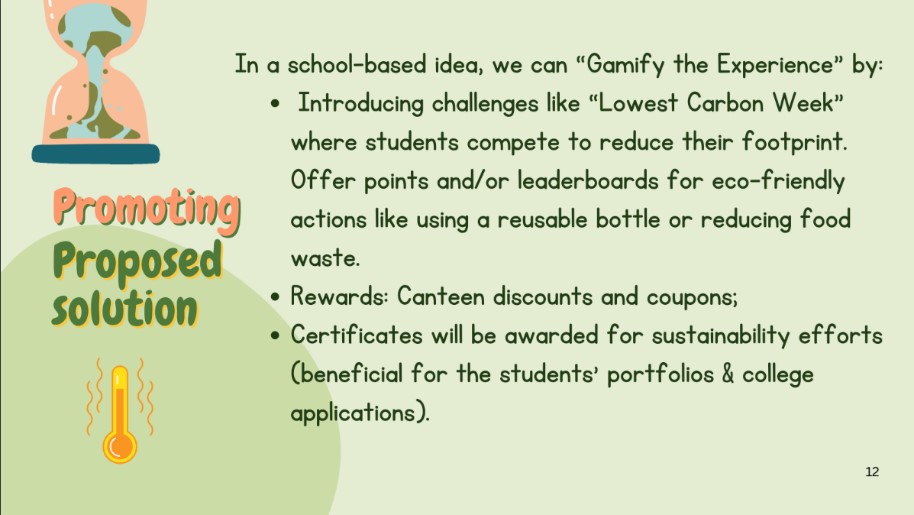
|
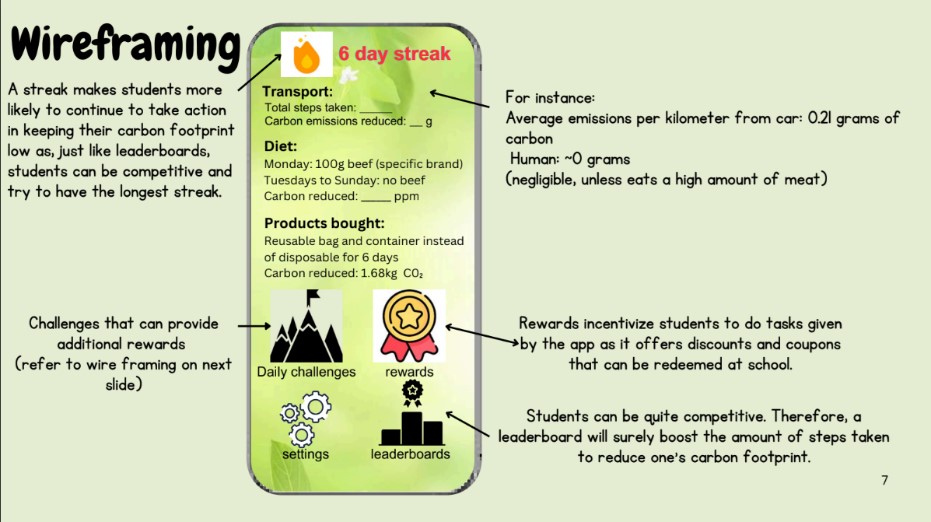
|
|---|---|
|
Wireframing of GreenTrack App Interface |
|
Go Green Challenge 2025
Our Environment Heads acted as ambassadors for environmental advocacy and education. They created informative posters to raise awareness of environmental and sustainability issues and took the lead in spearheading and maintaining the “Green Wall” in their classrooms— a dedicated space to inspire and engage their peers in eco-conscious practices.

|

|
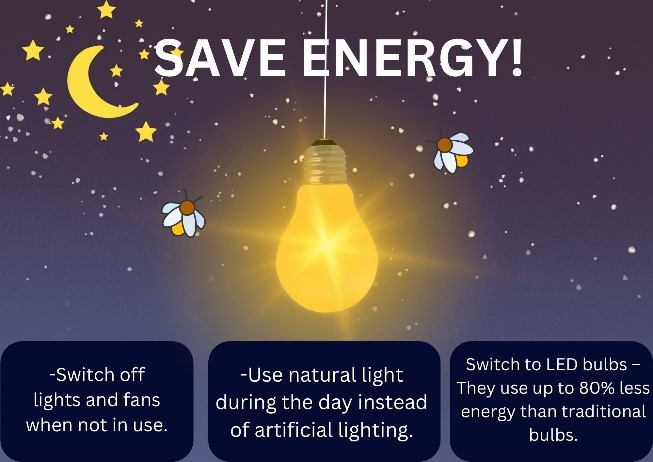

|
|---|---|---|
|
Voices for the Planet — Environment Heads Raising Awareness Through Our Green Wall Posters |
||
2024
Singapore Youth Water Conference 2024
Peicai Environment Heads participated in the Singapore Youth Water Conference 2024, organized by Raffles Institution. Titled “Singapore’s Water Future: Challenges and Opportunities for the Next Generation,” the forum emphasized the importance of water sustainability and management practices, such as desalination and NEWater, which Singapore uses to address water scarcity. The conference also highlighted future challenges like climate change and the need for proactive solutions to ensure water security. Key topics included the role of community involvement, youth engagement, and the use of technology, such as drones and AI, in achieving water conservation goals.
Following the conference, our Environment Heads shared these insights with their schoolmates during an assembly. They called for students to adopt new water-saving practices and facilitated discussions on how the school community can improve its water conservation efforts.
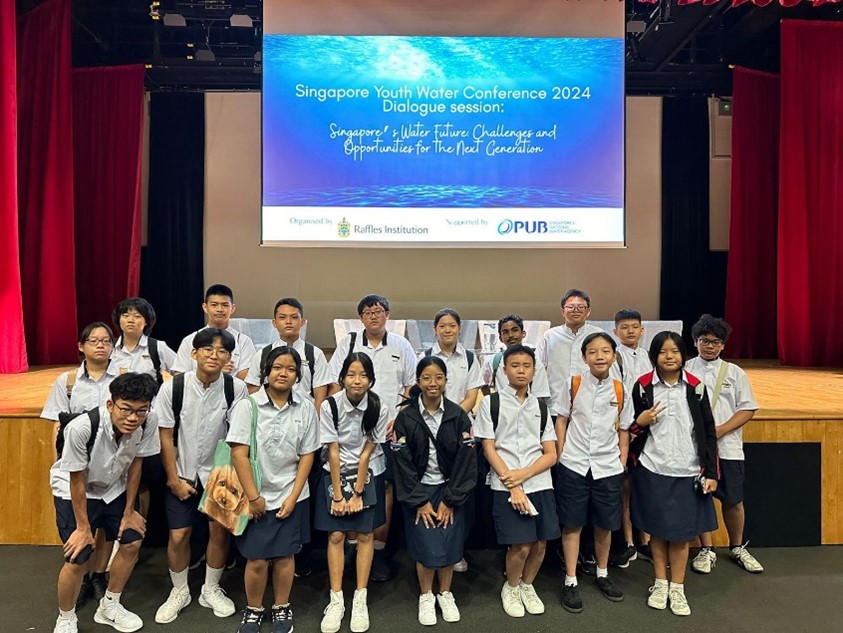
|
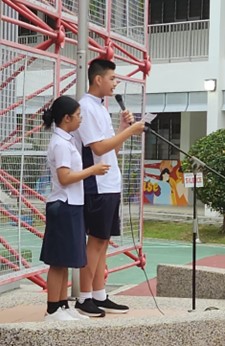
|
|---|---|
|
Environment Heads representing Peicai at the Singapore Youth Water Conference 2024 Dialogue Session |
Empowered and Inspired: Student sharing Key Takeaways on Water Sustainability |
School-wide recycling projects - “SembEnviro Plastic Recycling League” & “Pass-it-On Bazaar”
Students collected plastic waste for recycling, and donated used textbooks to their juniors, with leftover books being donated to “NTUC Share-A-Textbook Drive”.
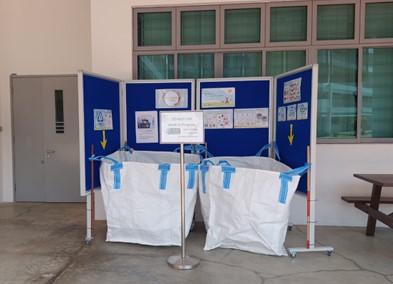
|

|

